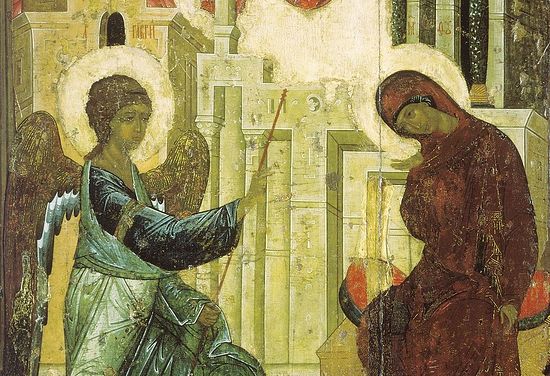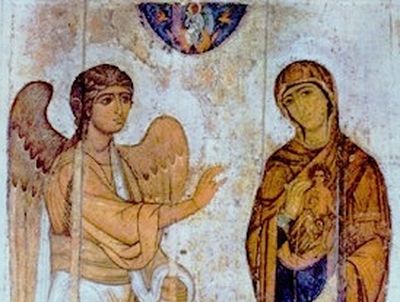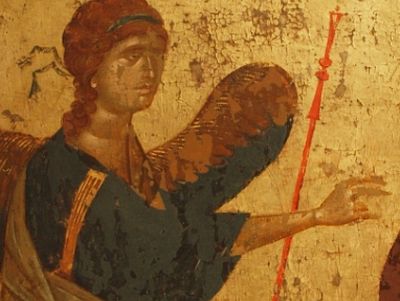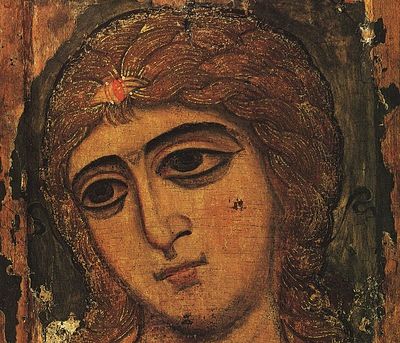Today the Archangel cries to the Theotokos Rejoice! (Lk. 1:28) thus announcing the good news of the undoing of the ancient curse.
The mother of the human race, Eve, heard pronounced, I will greatly multiply thy sorrow and thy conception; in sorrow thou shalt bring forth children, thus initiating the pain of childbirth, itself a shadow and sign of the death that lurks already behind every conception, and is the lot of every man conceived in iniquities (Ps. 50:5), touched as he is by ancestral sin.
In the words of St. Ephraim the Syrian, if not for sin, “She would have been preserved from the pangs of their births, from the ignominy of having to raise them, and from wailing over their deaths.”1 Pain and suffering and every kind of corruption was unknown by man, fashioned as an immortal vessel of grace, in his blessed life in Paradise. Every bodily infirmity images forth and reminds of the death that awaits all who live this side of Eden, as we confess nightly, when, pointing to our beds, we pray in the words of St. John of Damascus: “Behold, the coffin lieth before me; behold, death confronteth me.”
While already called to be fruitful and multiply while yet in Paradise, (Gen. 1:28) in a manner past understanding “foreknown to God,”2 it is to this side of the Fall that marriage and reproduction as known to us belong. “After the disobedience, after their loss in the Garden, then it was that the practice of intercourse had its beginning,” declares the Golden-Mouthed, in concert with a host of God-bearing Fathers.3
As pertains to the inner life of the Triune Godhead, so to the life of man fashioned in His image: Mode of life corresponds to mode of origin:
The Father is God. The Son is God. The Holy Spirit is God. Three equal in essence, will, power, dominion, power, glory, honor—equal in every way, none greater than another.
Thus, in what manner are They distinguished personally? In mode of origin.
The Father alone is unoriginate, the Son alone eternally begotten, the Spirit alone eternally proceeding. The exact expositor of the Orthodox faith, St. John the Damascene, declares that Christ bears those same attributes as bears the Father, “save that of being ingenerate,”4 and before him the prelate of Nyssa: “The idea of cause differentiates the Persons of the Holy Trinity, declaring that one exists without a Cause, and another is of the Cause.”5
Having fallen from the radiant mode according to nature into that below and against nature, to man was given the fallen mode of reproduction, from thenceforth bringing forth under the sway of the ancestral inheritance—the enemies sin and death:
When, however, he sinned by breaking God’s commandment, he was condemned to birth based on sexual passion and sin. Sin henceforth constrained his true natural origin within the liability to passions that had accompanied the first sin, as though placing it under a law. Accordingly, there is no human being who is sinless, since everyone is naturally subject to the law of sexual procreation that was introduced after man’s true creaturely origin in consequence of his sin.6
Eve heard of travail, but the mother of the Christian race, the Most Holy Theotokos, the New Eve, hears today pronounced “Rejoice!” and without pain will she bring forth the Christ Child,7 conceived not in iniquities and so untouched by ancestral sin. She is the virgin Garden renewed and fulfilled: “The virginal vineyard was not tilled,” exclaims St. Hesychios the Priest.8 Behind her conception lurked not death, that enemy of old, but life, and moreover Life, heralding the new birth of water and the Spirit that was to come.
Having borne a child, the Christian mother remembereth no more the anguish of travail (Jn. 16:21) as she hastens to bear to the baptismal font her child, that upon him might be bestowed the birth from above, wrought not in passion or iniquity and so accomplished without pain, cleansing him of the curse that indwelt him as his ancestral inheritance, and restoring him to the Edenic mode of being, united to the Life that swallows up death.
Thus, in Baptism the Church expels from the child the adversary of mankind already at work within him, crying to the Lord to Whose Incarnate Body the new child is being united, “Look upon Thy servant; prove him and search him and root out of him every operation of the devil. Rebuke the unclean spirits and expel them, and purify the works of Thy hands.”
And to the serpent himself: “Wherefore I charge you, most crafty, impure, vile, loathsome and alien spirit, by the might of Jesus Christ, Who has all power, both in heaven and on earth, Who said to the deaf and dumb demon, Come out of the man, and in nowise enter a second time into him: Depart!”
Having brought forth in sorrow, she now hears Gabriel’s Rejoice! as she beholds her child born anew through virgin waters. “For just as pain and sorrow came upon Eve and all her offspring until now, so too does the joy of Mary come upon all of her descendants,”9 declares St. Macarius the Great.
From the virgin soil Adam sprung forth unto life, but Nevertheless through envy of the devil came death into the world, declares the most-wise Solomon (Wis. 2:24). Beyond the walls of the Garden, we spring forth from the womb already unto death. Cleansing every new Christian in Baptism, our Mother the Church turns also to every radiant mother, taking her into its warm embrace, covering her with its protective veil, “healing her of the devil’s touch,” which came upon her “at the moment of the transmission of the ancestral death,” in the words of the Russian hieromartyr Daniel Sysoev.10
“Do Thou Thyself have mercy upon this Thine handmaid, who today hath borne this child, and be gracious unto her voluntary and involuntary offenses, and protect her from every diabolical cruelty … and vouchsafe to her health, and strength of soul and body; and surround her with bright and shining angels; and preserve her from every approach of invisible spirits,”11 the august Church prays on the first day after birth, confident in the mercy of God and the protection of His ministers.
And as the new mother returns again unto the Holy Chalice, the nurturing Church calls down upon her the mercy of the Most High, which alone prepares us for the Body and Blood: “Cleanse this Thine handmaid, name, whom Thou hast saved by thy will, and who cometh into Thy holy Church, from every sin and from every defilement, that she may be counted worthy to partake without condemnation of Thy Holy Mysteries.”12
With this prayer, the mother is numbered among those who shall stand in His holy place and receive a blessing from the Lord, and mercy from God [their] Savior, praying as they did in preparation for Holy Communion to be not only pure in heart, but, in the inherent union of body and soul, also to be of clean hands (Ps. 23).
In the Archangel’s Rejoice! we recognize our deliverance from the curse of old and the hand of Satan. In the Archangel’s Rejoice! we recognize our salvation, of which today is the beginning.
“Theotokos and Virgin, rejoice, Mary full of grace, the Lord is with Thee. Blessed art Thou amongst women, and blessed is the fruit of Thy womb, for Thou hast borne Christ the Savior, the deliverer of our souls.”







